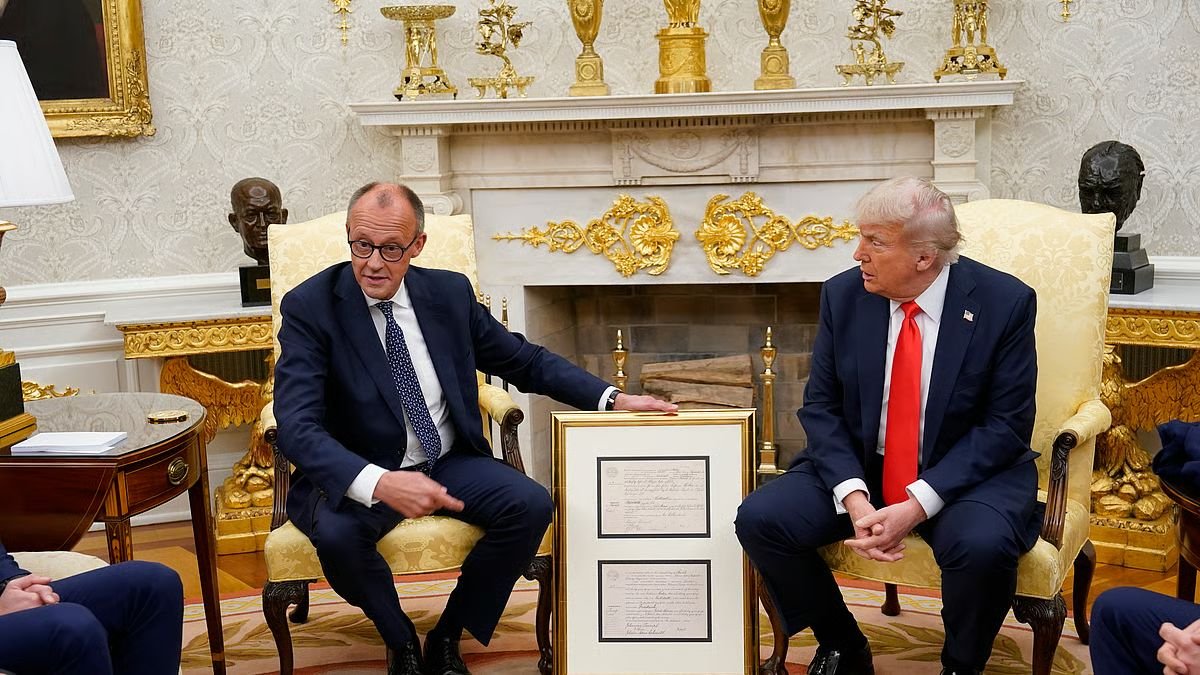
German Chancellor Friedrich Merz listens as Trump boasts about cutting Nord Stream 2.
By Miguel do Rosário
Historians and scholars of diplomacy will struggle to find a moment more degrading, a more humiliating example of one nation’s vassalage to another, than what took place during President Trump’s press conference with current German Chancellor Friedrich Merz. The meeting, held yesterday in the Oval Office, saw the American president openly brag about cutting off the Russian Nord Stream 2 pipeline to force Germany to buy American oil — right in front of the German leader.
“I’m the one who ended Nord Stream 2, going to a place called Germany, come to think of it. I’m sorry I did that. I ended Nord Stream 2, nobody else did. And then when Biden came in he immediately approved it… And by the way we have so much oil and gas you will not be able to buy it all,” Trump said, laughing, while looking at Merz.
Friedrich Merz, the conservative CDU leader who became German chancellor on May 6, 2025, and was making his first visit to the U.S. since taking office, listened to Trump’s confession with an awkward smile — a telling example of the submissiveness Europe’s largest economy now displays toward the United States. In fact, Merz’s demeanor throughout the conversation was revolting. His posture, voice, words, gestures — his entire presence exuded a foul stench of vassalage, subservience, and low self-esteem. It was painful to watch.
Trump’s statement was an explicit admission of the most serious sabotage of strategic European infrastructure since World War II. Nord Stream 1, which was bombed in September 2022, and Nord Stream 2, which was never put into operation, were both massive infrastructure projects built with European funds to transport Russian gas — from one of the world’s largest reserves — to the European Union.
The Nord Stream 2 project cost €9.5 billion ($10.83 billion at current rates), financed by Russian state-owned Gazprom with the support of five European energy firms: Austria’s OMV, Anglo-Dutch Shell, France’s Engie, and Germany’s Uniper and Wintershall. All this investment was lost after the sabotage, and neither Europe nor Germany made any serious effort to investigate who was truly responsible.
The numbers reveal the scale of what was destroyed. Nord Stream 1 had an annual capacity of 55 billion cubic meters and transported 59.2 billion in 2021 — its highest mark since operations began. Nord Stream 2, completed in September 2021 but never activated, would have doubled that capacity to 110 billion cubic meters per year. Together, the pipelines represented more than half the gas Europe imported from Russia.
The absurdity of the situation becomes even clearer when one considers the costs and economic impact. Germany consumes roughly 100 billion cubic meters of natural gas per year, 55% of which came from Russia before the Ukraine conflict. In the first quarter of 2025, the European Union paid an average of €1.08 ($1.23) per cubic meter for U.S. liquefied natural gas — exactly double the €0.51 ($0.58) it paid for Russian LNG. Russian gas delivered by pipeline, when still available, cost only €0.32 ($0.36) per cubic meter.
The math is devastating for the German economy. If Germany were still buying its 55 billion cubic meters of gas annually from Russian pipelines instead of U.S. LNG, it would save $47.85 billion per year. Over a decade, the savings would total $478.5 billion — more than 44 times the amount lost with the Nord Stream 2 investment.
Today, Europe prefers to import far more expensive liquefied gas from the United States, through a process that is also significantly more polluting. U.S. gas is primarily extracted through hydraulic fracturing (fracking), a method banned in many parts of Europe for environmental reasons. In the U.S., the gas must be liquefied to be shipped across the Atlantic, then regasified upon arrival in Europe. This entire process dramatically increases both costs and environmental impact.
Germany is now in economic crisis largely because of this forced change. Industrial costs have soared since the country stopped buying Russian gas, making German energy uncompetitive. Natural gas is especially important for industrial production, and its rising cost directly undermines the competitiveness of German manufacturers in global markets.
German industries are losing ground due to skyrocketing energy costs, while China is gaining an advantage by buying cheaper Russian gas now redirected to the Asian market. Wolfgang Münchau, author of Kaput: The End of the German Miracle, notes that “the German miracle is over.” At the height of hyper-globalization, Russian gas provided cheap fuel to German industry — but that era, with Germany at the top, is gone. Major players in the chemical, engineering, and automotive sectors are struggling, along with the smaller supply networks that support them. Volkswagen, the largest private employer in Germany, is threatening to close factories in the country for the first time in its 87-year history.
Meanwhile, Russia has suffered no real losses. It simply shifted its gas exports from Germany to China. China, in turn, has increased its competitiveness compared to Europe, benefiting from the cheaper gas that once fueled German industry. The only real winners in this scenario are the American oil and gas companies now selling LNG to Europe at inflated prices — reaping extraordinary profits at the expense of Europe’s deindustrialization.
Chancellor Friedrich Merz listened to all of this with a smile during the White House meeting. The level of vassalage is surreal. Trump publicly admitted to working against Germany’s energy infrastructure, forcing the country to buy lower-quality, overpriced American energy — and Germany’s top representative reacted as if he were hearing a casual remark about the weather.
This scene marks a historic moment in global diplomacy: rarely has a world power so openly confessed to sabotaging the infrastructure of an ally, and even more rarely has the sabotaged nation responded with such submission. Germany, once the economic engine of Europe, now serves as a cautionary tale of how geopolitical dependence can transform a prosperous country into an economic vassal of its so-called allies. With an annual energy overpayment of $47.85 billion, Germany is paying the highest price in history for its submission to Washington.
After the meeting, the German chancellor posted the following message on his social media:
“The US and Germany share the same DNA. We are partners. We are friends. We are literally family. Many citizens here in the US have ancestors from Germany. I just gave President Trump a copy of his grandfather’s birth certificate. He was born in Kallstadt, Germany, in 1869.”








